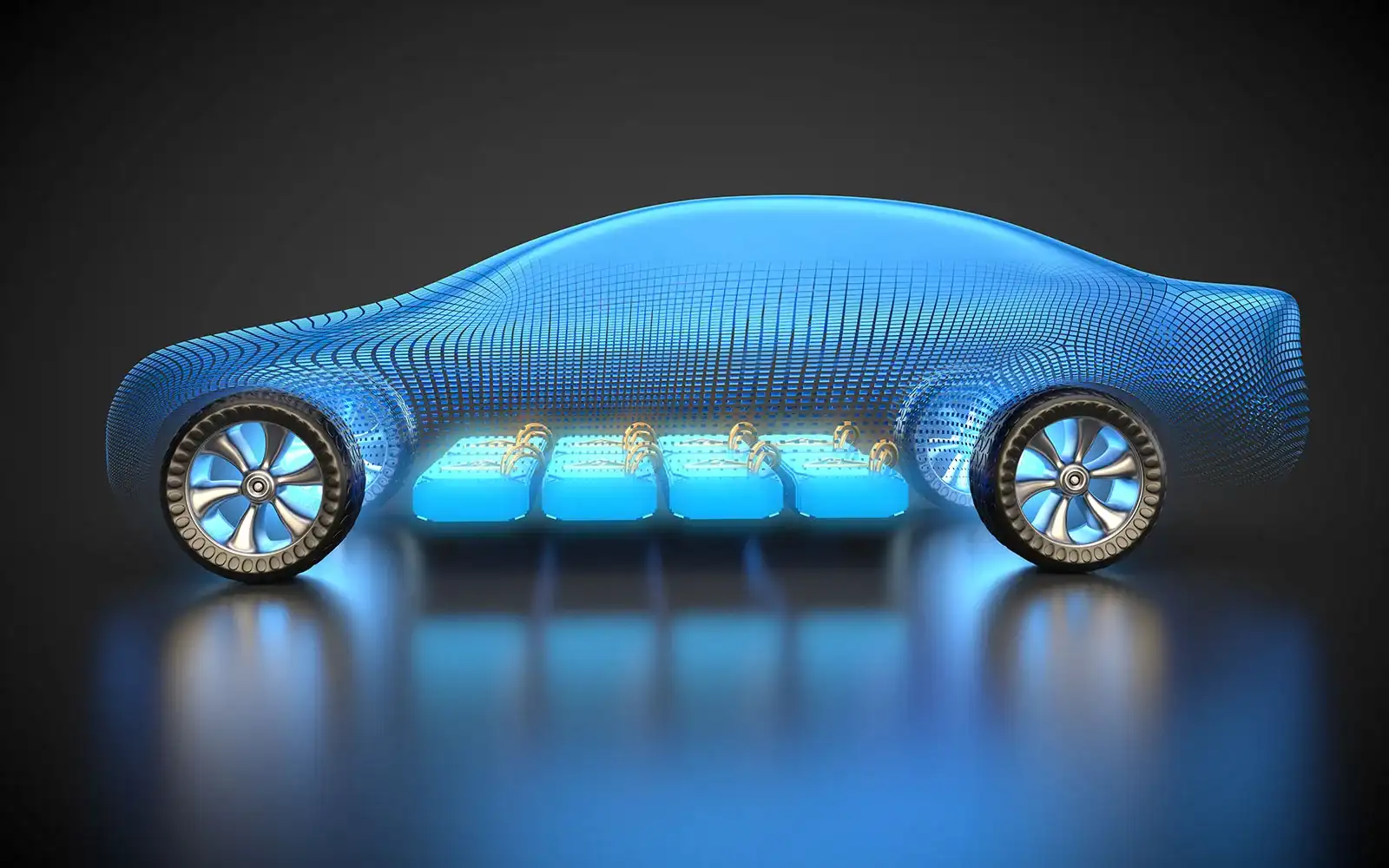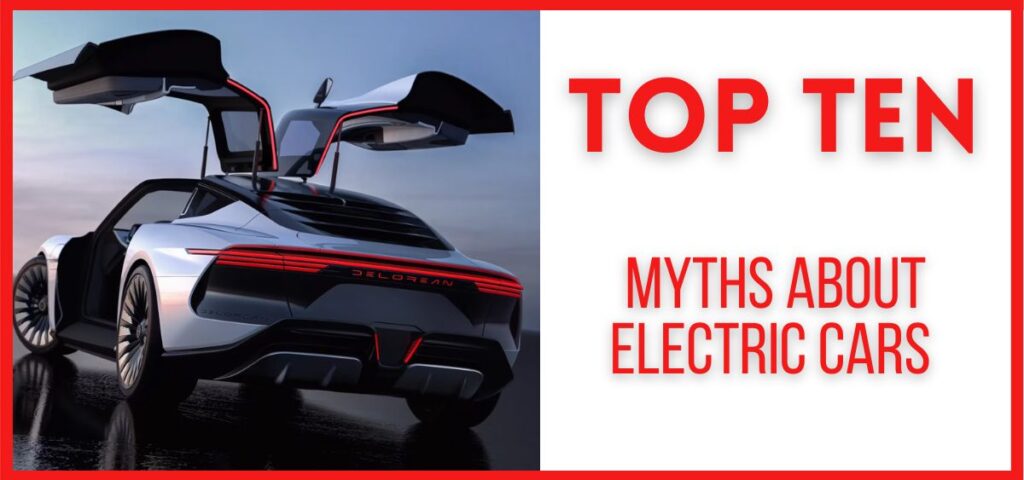EVs: Myth vs. Reality! Top 10 Electric Car Misconceptions We Leave Behind in 2025
Myths about electric cars are rampant, but as their popularity surges, it’s crucial to separate fact from fiction. In 2025, we debunk the top 10 misconceptions about EVs, addressing concerns related to range, charging time, environmental impact, and overall performance. By dispelling these myths, you can make an informed decision about whether an electric vehicle suits your green, tech-driven lifestyle.

Also read! Top 10 Reasons to buy hybrid cars
1. Myth Busters: Electric Cars Can’t Go the Distance
Myth buster: You can’t travel long distances with an electric car, the era of electric cars with limited range that caused “range anxiety” is over! Modern electric cars have a very good range, often over 300 miles on a single charge. Advances in battery technology and efficient propulsion continuously increase this number. In addition, a rapidly growing network of public and private charging stations makes long trips possible. The trip planning app lets you find stops along your route so you can hit the road with confidence knowing you’ll get to your destination with a charge.
Also read! Ten things to consider when buying a hybrid car
2. Slow Charge, Slow Down? Debunking the Electric Car Charging Myth
Is the charging slow or slow? You don’t need to wait hours for a full charge. Advancements have made it easy to charge electric vehicles. Universal DC fast chargers can charge your battery significantly from 20% to 80% in just 15 minutes, making them ideal for quick charging on road trips. Even if you charge it overnight at home, it will always be fully charged and ready to go when you wake up. Additionally, with the continued expansion of charging networks and innovative solutions such as wireless charging on the horizon, maintaining an electric vehicle’s power supply will become growing timely and able, removing range anxiety.
Also, read! Ten tips for improving your car’s fuel economy
3. Electric Cars: Green Savior or Secret Polluter?
Electric cars are welcomed as environmental heroes, but gossip about a “hidden pollution” problem continues. Battery production is affected but is constantly improving. The real story is in use. Electric vehicles have zero greenhouse gas emissions, significantly reducing carbon emissions, especially when charged with clean energy sources such as solar or wind. Studies have shown that even considering the entire life cycle of electric vehicles, they outperform gasoline vehicles in total emissions. Electric vehicles are therefore a step towards a cleaner future, but continuous efforts to minimize the environmental impact during the production process are important.
Also read! Top Ten things to do when your car battery dies
4. Winter Woes: Can Electric Cars Handle the Cold?
Winter worries: Can electric cars withstand the cold Are electric cars built to withstand bad weather, including freezing temperatures? Modern electric vehicles have sealed battery compartments and advanced thermal management systems that regulate battery temperature and ensure optimal performance even in very cold conditions. The range may be reduced somewhat due to the increased energy demand for heating, but this effect can be minimized by preconditioning the vehicle during plug-in. So rest assured, your electric car will survive your winter commute without breaking a sweat (or your battery!).
Also read! Top Ten Battery Technologies That Will Revolutionize the Automotive Industry
5. Electric Snoozefest: Mythbusting Speed and Performance in EVs
Let go of the stereotype that electric cars are boring alternatives. Electric vehicles provide instant torque or a feeling of pulling power the moment you press the pedal. This creates a smooth and exciting driving experience that beats many petrol cars. Many electric cars have impressive acceleration times and surprise drivers with explosive power. So, buckle up and get ready for an eco-friendly and emotional fun ride.
Also read! Top Ten Tips for Driving Safely in Winter Weather
6. Nowhere to Plug In? The Electric Car Charging Desert Myth Debunked
The fear of running out of power on a long trip with no place to charge – the “myth of electric car charging in the desert” – is becoming increasingly out of date. The charging infrastructure landscape is rapidly evolving. Public charging stations are popping up at a steady pace, with networks strategically placed along major highways and in city centers. In addition, many businesses and shopping centers offer charging options that make it convenient to charge your battery while running errands. A trip-planning app can help you find stops and ensure a smooth journey. While options may still be limited in remote areas, the future of electric vehicle charging is bright, with advancements like wireless charging on the horizon further reducing range anxiety.
Also read! Top 10 best-selling cars in the world
7. Grease Monkey No More? The Truth About Electric Car Maintenance
Electric cars are welcomed in the world of oil change and tuning. Electric vehicles have fewer moving parts than gasoline vehicles, which means they require much less maintenance. Regular service intervals focus on inspections and software updates to keep your car running smoothly. While wear and tear on your brakes and tires is sure, regenerative braking in electric vehicles will extend the life of your brake pads. In general, electric vehicles offer a simpler and more cost-effective maintenance experience, saving you from the dreaded trip to the mechanic.
Also read! Ten best luxury cars in the world
8. Sparking Fears: Are Electric Cars a Fire Hazard?
Although initial concerns about battery fires made headlines, electric vehicles are designed with safety in mind. Modern electric vehicles undergo rigorous testing and use extensive fire safety measures. A fire-resistant battery box and internal monitoring system minimize the risk of overheating. Additionally, unlike gasoline vehicles that leak flammable fuel, electric vehicles are statistically less prone to fires. So you can enjoy the electric driving experience safely without using a fire extinguisher.
Also read! Top 10 Ways To Extend Your Car’s Battery Life
9. Electric Cars: Practical Powerhouse
Electric Vehicles: A Practical Energy Source Forget the misconception that electric cars are only for environmental warriors. Modern electric cars are designed with everyday use in mind. With plenty of cargo space, a comfortable interior, and advanced equipment comparable to a gasoline vehicle, it will fit your lifestyle. What’s more, the benefits go beyond the first drive. Instant torque provides a smooth and exciting driving experience, while reduced maintenance costs and energy efficiency provide significant long-term savings. Whether for daily commuting, errands around town, or even road trips with a growing network of charging stations, electric vehicles offer a powerful and practical solution to sustainable mobility.
Also read! Ten Signs That Your Car’s Battery is Dying
10. Myth Busting: EVs for Everyone, Not Just Green Enthusiasts
Also read! Top 10 Reasons to Buy Renault Megane
Future of Electric Cars
The future of myths about electric cars includes a decline in their popularity and a shift to more nuanced discussions about the technology. Here’s a breakdown of what we can see:
- Range and charging: As battery range increases and charging infrastructure expands, myths about limited range and long charging times may be dispelled.
- Cost: With advances in technology and potential cost reductions, the “expensive electric car” myth will become less relevant. Government incentives and low maintenance costs can be a big talking point.
- Safety: As safety features and regulations improve, electric car fire concerns will decrease.
- Environmental impact: Discussions can go beyond just tailpipe emissions and encompass the entire life cycle of electric vehicles, including battery production and disposal.
- Practicality: Conversations may focus on factors such as charging accessibility in specific regions or the suitability of EVs for specific needs (eg, towing capacity).
- Performance: As electric cars become more powerful and handle different weather conditions smoothly, the focus may shift to comparing specific models and their performance capabilities.
- New Myths Emerging: As technology continues to evolve, entirely new myths about electric cars may emerge. It is important to stay informed and rely on reliable sources.
- Role of Education: Continued education about electric car technology and its environmental impact will be crucial to dispel myths and promote informed consumer choices.
Overall, the future of myths about electric cars may be one of less misinformation and more balanced conversations about the potential and limitations of the technology. By staying updated on the latest developments and engaging in open discussions, we can navigate the future of electric cars with a clear understanding of their benefits and considerations.
Also read! Top 10 Myths About Electric Vehicle Maintenance Busted
FAQs: Myths About Electric Cars
Q. Electric cars can’t go far enough on a single charge, right?
Mythology! Modern electric cars have a very good range, often over 300 miles. Fast charging technology and a growing network of stations make long trips possible.
Q. Is EV the future?
The future of mobility is unmistakably shifting toward electric vehicles (EVs), with nearly all major automakers actively planning to phase out the sale of fossil fuel-powered vehicles
Q. Are electric cars good quality?
Compared to traditional-powered cars, electric vehicles (EVs) have smaller moving parts. EV supporters assert that this mechanical effortlessness will result in fewer component failures and make electric cars more reliable
Q. Do electric cars harm the environment…especially in battery production?
A legitimate concern! However, battery production is constantly improving its environmental footprint. In addition, electric vehicles produce zero greenhouse gases, which significantly reduces carbon emissions, especially when using clean energy sources.
Q. Can electric cars withstand cold weather?
totally! Modern electric cars are built to withstand different weather conditions. Sealed battery compartment and advanced thermal management system ensure smooth operation.
Q. What is the real future of electric cars?
Electric vehicles could make up as much as nearly half of global car sales by 2035, and our analysts forecast that more advanced autonomous or partially autonomous vehicles will make up the same share of sales just five years later. It’s a fundamental shift, upending labor markets, supply chains, and commodity markets.
Q. What is the biggest problem with electric cars?
Also read! Top 10 Electric Vehicle Technologies
In conclusion, Myths about electric cars are being dismissed as these vehicles revolutionize the way we drive, showcasing their true potential through technological advances. Despite the remaining challenges, electric vehicles are becoming more practical, affordable, and safe. With expanding charging infrastructure and improving battery technology, they are set to dominate the road. Whether you’re an environmentally conscious driver seeking a sustainable option or simply looking for a powerful and exciting driving experience, electric cars warrant serious consideration. Embrace the future of transportation—it’s electric!


































